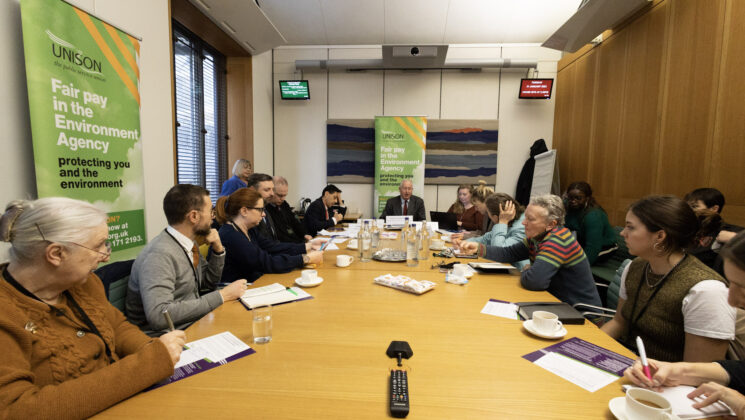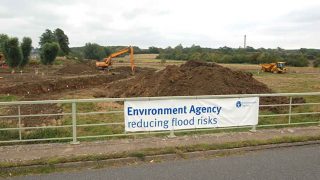Tuesday marked the 70 year anniversary of the North Sea Flood when over 300 people lost their lives across Scotland and England’s east coast in 1953 when a storm surge overwhelmed sea defences in over 1,200 places along the UK’s east coast and, in today’s terms, causing around £1.2bn of damage.
To mark the day, UNISON organised a roundtable event for Westminster parliamentarians to learn about the work of the Environment Agency (EA) as well as understand the issues currently affecting it.
MPs and peers from across the political spectrum attended and agreed on the importance of the work that EA workers undertake.
The roundtable opened by addressing the role played by EA staff in responding to the North Sea Flood, and recognised that, with the impact of the climate crisis worsening every year, the work of the agency and its staff is becoming more important than ever before.
Discussion highlighted the key role of the EA in meeting the UK’s climate obligations and emphasised that a well-resourced agency should be something all parties can agree on in order to ensure the country maintains an environment that is fit for the future, as well as being prepared in the event of flooding and other environmental disasters.
Within this discussion, the need for higher pay was recognised as key for the EA to be able to operate.
Pay in the EA
However, while the agency is now a fourth emergency service, staff have been underpaid and undervalued by the government for over a decade.
The attendees heard that the real value of pay in the EA has been eroded significantly, with pay awards falling below the rate of inflation in every year but one since 2010.
This meant that in 2021, even before historic inflation rates began to bite, the average EA worker’s salary was 20% lower than it would have been if pay rises had kept pace with inflation for a decade – the equivalent of working one day in five for free.
It was acknowledged that most staff in the agency are not just working for the money but are passionate about the service they provide, however, as a consequence of years of pay degradation, many experienced agency workers are voting with their feet and have left the agency to seek better pay with employers that recognise the value of their skills and experience.
Moving on to the current dispute the roundtable addressed the fact that in 2022, EA workers received a pay offer of 2% plus £345 consolidated increase with an average increase in take-home pay of just 46p per hour, at a time when inflation reached over 13%.
This has led to serious recruitment and retention issues in the agency and caused Sir James Bevan, chief executive of the Environment Agency, to write to the environment secretary to say that the level of pay rises offered to EA staff in 2022-23 was “unjust, unwise, and unfair [when] EA employees have taken a series of real terms pay cuts, while working harder and harder”.
Low morale, poor remuneration, an ageing workforce, and the difficulty in recruiting hinders the EA’s ability to deliver on its objectives and the strength of feeling among workers about this became clear toward the end of 2022.
Industrial action
In October the pay offer was put to UNISON members, resulting in an 87% vote to reject it, with the subsequent industrial action ballot in November returning a 73% vote for strike action.
As a result, over December EA workers undertook nine days of industrial action short of strike in the form of a withdrawal from ‘voluntary’ incident response cover, with a full day of strike action following on 18 January and another planned for 8 February.
Moving forward
During the roundtable, support was shown for a debate in parliament on the issue of EA pay as well as offers to make contact with the DEFRA secretary of state to see what options exist for resolving the dispute.
UNISON national secretary for the environment Donna Rowe-Merriman, said: “The roundtable was an important opportunity to speak directly to legislators about an under-reported issue, and it was very successful in that respect.
“Moving forward, however, UNISON is calling on all parliamentarians from across the political spectrum to take action on this issue. Environment Agency workers do some of the most important jobs to protect and secure the environment for both today and tomorrow’s generations and the government must be held to account on its denial of a fair pay settlement.
“It is vital that environmental protection officers, biodiversity officers, flood defence workers and countless other roles crucial to maintaining environmental protection and safety receive a fair pay settlement that recognises the added impact of the current cost of living crisis.”




